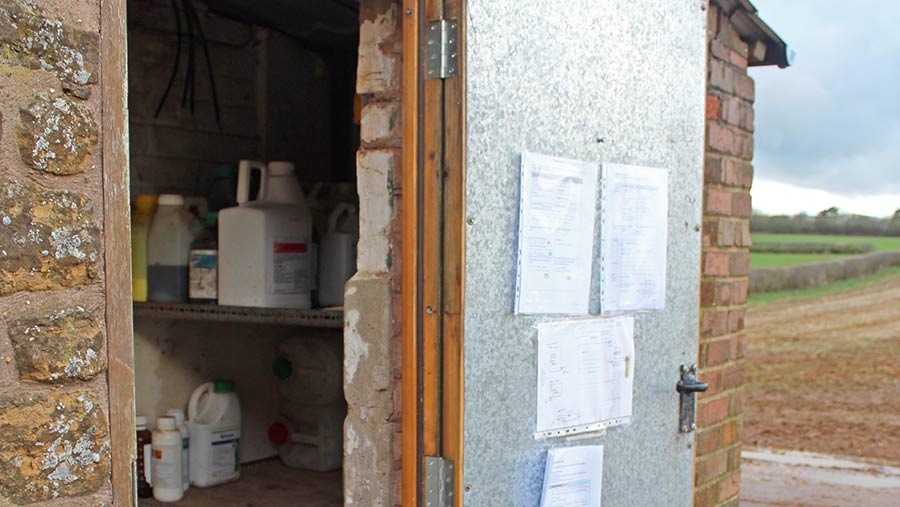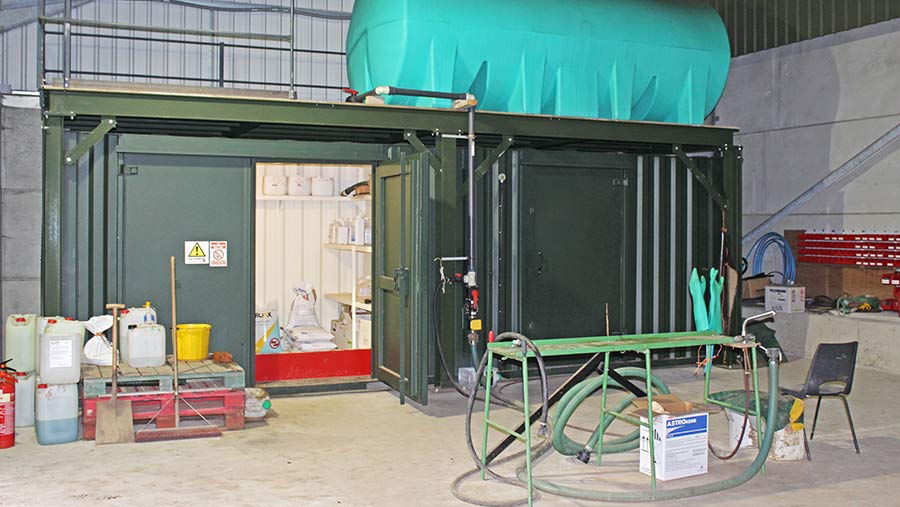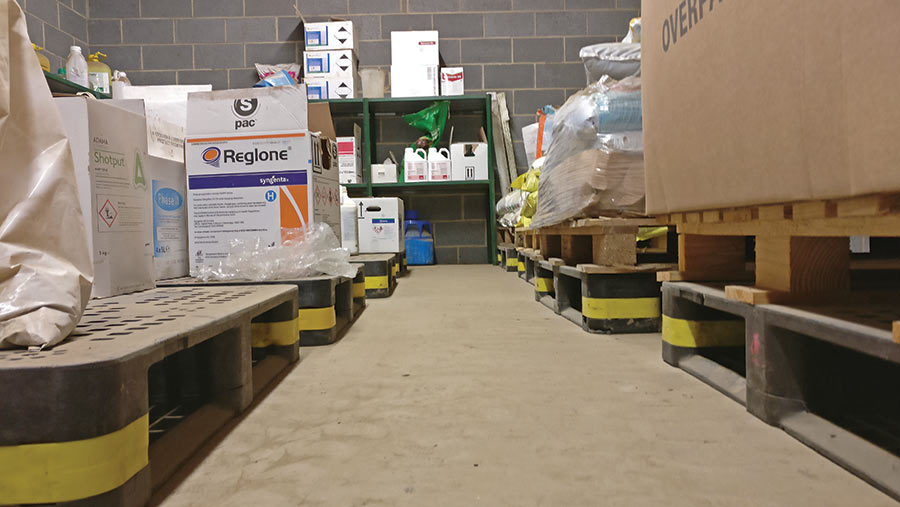Video: How 3 farmers spruced up their spray stores
Having the right spray store set-up will help growers stay on the right side of the law, keep valuable spray stocks safe from criminals and save spray operators a significant amount of time when filling.
In addition, after a push from the Agricultural Industries Confederation, next-day delivery systems are on offer from all major agrochemical distributors, allowing the amount of stock needing to be held to be minimised
This has helped cut costs by reducing the store size needed, and means that growers looking to upgrade facilities could end up spending less than they had anticipated.
See also: How more farmers can benefit from biobeds

Chemical store on Sherricliffe Farm.
The barn conversion
Arable and cattle farmer Simon Green, who has run Sherricliffe Farm near Grantham in Lincolnshire since 1991, says that fitting out a store to service his 80ha of arable land cost “just a few hundred pounds”.
He kept a firm lid on costs by converting part of an existing building, which had previously housed the vacuum pump belonging to a former dairy enterprise, and says that the lights were the most expensive fitting.
Nevertheless, the store meets all legal requirements, including being bunded to trap any spills, and has a sufficient amount of sturdy shelving to keep liquids and powders stored securely.
It even benefits from being stored next to the biomass boiler in an adjacent area, which keeps potentially damaging frosts at bay.
Mr Green fitted a 1,000-litre tank to the roof of another nearby shed, meaning the sprayer can be parked in between the two buildings so that agrochemicals need only be transported a few yards for filling.

George Neale’s chemical store.
The off-the-shelf option
Cereals, rapeseed and sugar beet grower George Neale who farms 260ha near the village of Kneeton in Nottinghamshire purchased a chemical store to fit inside his workshop.
He replaced various out-of-date lean-tos and fan-ventilated brick silos with a nine-bay shed incorporating a 3000t grain store and underfloor gas heating.
The machinery store and workshop comes under the same roof and is fully secured, offering a second layer of protection to the chemical store in an area where most farmers are security conscious, given the close proximity to major trunk roads.
Manufactured by Lincolnshire firm C&J Supplies, it contains a fully-fitted spray store in the one half of the unit, with lighting, shelving and a bund, and a spray operator’s rest room in the other half with washing facilities and a toilet.
It was also sturdy enough to take the water store on the roof, and is positioned adjacent to one of the outer shed doors, enabling the sprayer to be pulled directly alongside for refilling.
Chemical stores can be purchased from the company in a variety of sizes from 3m x 2m x 2m up to 12m x 3m x 2m and prices start from £2,995, excluding VAT and delivery.
Similar options are also available from a number of other manufacturers.

RJ & AE Godfrey’s chmical store.
The bespoke option
Farm manager Will Gagg, who oversees operations for RJ & AE Godfrey on 930ha of owned and rented land, opted for a breeze block store inside a larger building.
The business, located to the north-west of Scunthorpe, but with another block of land on the Yorkshire Wolds, has a long rotation of cereals, oilseed rape, vining peas, sugar beet and about 200ha of potatoes annually.
It was the spuds that forced him to opt for a larger store which could incorporate pallet storage in order to accommodate the significant volume of sprays needed during the blight spraying season.
“With the new strains of blight we are spraying every seven days. We always have that week’s stock in and are generally ordering the next two weeks stock to be able to anticipate different weather patterns,” says Mr Gagg.
When deciding how big to build the store, he mapped out how many pallets would be required based on a worst-case scenario plus 20% for future-proofing.
He advised anyone thinking of building a similar store to ensure they have enough area to leave plenty of room for easy access between pallets.
Fungicides, herbicides and insecticides are stored separately on shelves, along with the last few bottles from the end of a pallet, and Mr Gagg credited his sprayer operator Sam Fawbert with keeping stock organised and ensuring that oldest products were always used first.
The store has its own exterior door which opens onto a covered and bunded filling area which is large enough to take the entire volume of a full sprayer in the unlikely event of a leak.
Mr Gagg has also invested in plastic pallets to replace the traditional wooden pallets that spray is delivered on following advice from storage inspectors as they can be cleaned if they become contaminated but wooden pallets cannot and are difficult to dispose safely.
For more information on the subject, speak to your agronomist or spray distributor and consult the Health and Safety Executive Guidance (PDF) and check out the video of the three spray stores below:

